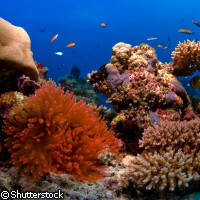Scientists find evidence of marine biodiversity hotspots
An international team of researchers joined forces to investigate the evolution of marine diversity over the last 50 million years. Their findings show that the main concentrations of biodiversity climaxed in key hotspots: southwest Europe, northwest Africa and the modern Indo-Australian Archipelago, as well as the eastern shore of the Arabian Peninsula, Pakistan and west India. The detailed work was recently published in the journal Science. Researchers from Australia, Malaysia, the Netherlands, Panama, Spain, the UK and the USA showed that ecological processes over a 50-million-year period fuelled the emergence, evolution and reduction of biodiversity hotspots in question. But how does human activity accelerate the evolutionary process of areas? And in particular, how vulnerable are the coral reef ecosystems? The team said the Indo-Australian Archipelago has been the tropical centre of extreme diversity since the Miocene epoch (the longest epoch of the Cenozoic era) of 23 to 5 million years ago. The study provides evidence of the presence of large benthic foraminifera, gastropods, mangrove pollen types and corals in the Archipelago region - a truly old area. The investigation of the Indo-Australian Archipelago in particular strengthens the understanding of biodiversity hotspots, as well as how the ecological processes have been working over geological time scales. The latter is especially important because these processes have coincided with huge tectonic events over the years. By examining the paleontological and molecular data - specifically by combining molecular evidence and the fossil record - and translating this information in an ecological context, the researchers were able to expand their knowledge on the true antiquity of hotspots and their component species. But, as the team pointed out, further investigations are needed. Growing concerns over marine biodiversity and the vulnerability of coral reef ecosystems in particular are compelling scientists to strengthen research in this area. So what about human-induced changes? The scientists said these changes are 'operating on time scales far removed from those that have created these hotspots'. According to them, a better understanding of the 'geographic and environmental context fuelling the origins, maintenance and reduction of hotspots over long periods of time is needed if people are to further their understanding of the nature of biodiversity hotspots'.
Countries
Australia, Spain, Malaysia, Netherlands, Panama, United Kingdom, United States



